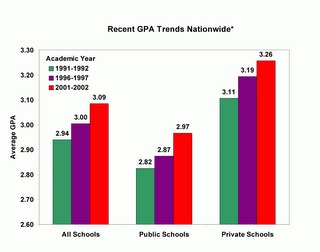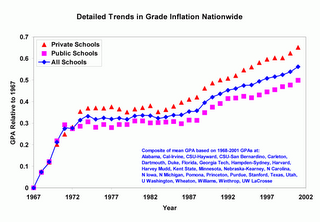
 Graphs above are from the website GradeInflation.Com, run by a retired Duke University professor.
Graphs above are from the website GradeInflation.Com, run by a retired Duke University professor.Also, there is an article titled "When Bs Are Better" in the current issue (subscription required) of The Chronicle for Higher Education (subscription required) by a Rutgers management professor:
In the fall of 2001, The Boston Globe reported that 91 percent of the seniors who had graduated from Harvard University the previous June had received honors, prompting an investigation that concluded grade inflation was indeed a serious problem at Harvard.
Faculty members have not fulfilled the responsibilities associated with their proclaimed right to be the final judges of student performance. In shirking that duty, they have also neglected their broader obligations to society: Teachers weaken rather than bolster the commonweal when they fail to award meaningful grades. Grading laxness at all levels of American education has contributed directly or indirectly to a variety of problems, including declining scores on the SAT, decreases in the ability of American undergraduate and graduate students to understand prose, and poor training in mathematics and science, which puts American students behind their peers in many European and Asian countries.
Could more-realistic grading stem the tide? Ample evidence shows that students learn more when the bar for success is raised rather than lowered. For example, Valen Johnson's Grade Inflation contains analyses demonstrating that students who took prerequisite courses from teachers who were tough graders performed better in upper-division classes than did students whose prerequisite courses were taught by easier graders.
What are universities doing?
Carpe diem.A few universities have established grading standards, and their administrators monitor professors' compliance. Perhaps the most heralded example is Princeton University's adoption of limits on the percentage of A's given in undergraduate courses. And in the M.B.A. programs at the University of Chicago and New York University's Leonard N. Stern School of Business, online grade-reporting systems will not accept an instructor's grades in certain courses if the grades exceed school or departmental standards.






No comments:
Post a Comment